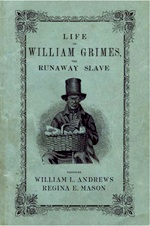
 For nearly 150 years, the autobiography of William Grimes sat in relative obscurity on the shelves of a New Haven, Connecticut Historical Society.
For nearly 150 years, the autobiography of William Grimes sat in relative obscurity on the shelves of a New Haven, Connecticut Historical Society.
It wasn't until the late 1990s when Regina Mason, the great-great-great-granddaughter of Grimes uncovered her familial link with a man who had chronicled his life's story as a freed slave nearly four decades before the Emancipation Proclamation was signed.
Mason speaks about her new reissue of the book, "Life of William Grimes: the Runaway Slave," in Portland on Tuesday, Jan. 27 at 6 p.m. at Reflections Café and Talking Drum Book Store and in Seattle on Jan. 29 at 6 p.m. at the Northwest African American Museum.
The book was originally published in 1825 and again in 1855 at the expense of the author. It wasn't until these last two decades that Mason would uncover her familial link to a man who escaped the clutches of bondage in the South, only to find himself, in the equally uncaring North, a freer man.
Mason's odyssey to understand her past began when she was in the fifth grade. Her teacher had given the class an assignment to research where their family had originated. For Mason, it was Africa, a continent she says she felt no kinship for. Although the details of the report are long forgotten, that assignment launched a lifelong passion to understand her ancestor's lives in America.
"It didn't make me feel good about who we were as people," she said. "It was the first time I had heard we used to be slaves. … I couldn't get beyond the inherent complexities of what it meant to be a slave."
In particular, Mason grappled with the issue of the rape of enslaved women and the forced breakup of their families.
Grimes' father was a prominent slave owner who dined with George Washington and fought in the Revolutionary War; Grimes' mother was a slave whom he was sold away from at a fairly young age.
Mason and her colleague, co-editor William L. Andrews, a professor at the University of North Carolina-Chapel Hill, conducted extensive research into the people, places and events in Grimes' accounts. The book is full of annotations, timelines, letters, portraits and photographs that help explain many passages and situations previously un-researched.
Although "Life of Williams Grimes" had been available in modern times in "Five Black Lives," by Arna Bontemps, Andrews says this is the first time scholarly research has been conducted. He says Mason – an untrained researcher who spent years detailing her family lineage -- has gone to painstaking detail to ensure an accurate explanation of the tale.
Throughout Grimes' accounts of his life are constant reminders of the extreme violence that was perpetrated against the enslaved.
Andrews says Grimes' work – unlike books by more famous people such as Frederick Douglass – was untouched by White editors or ghostwriters.
And unlike other narratives that featured authors who forgave the White master, Grimes had a long memory and wasn't soon going to forgive or forget -- although the kinder, more forgiving aspects of his personality do come out in the volume.
In comparing the differences between the autobiographies of Frederick Douglass and Grimes, Andrews says it's clear Grimes had a different agenda.
Douglass worked in the confines of the Anti-Slavery Society. Grimes appeared to be too unmanageable for the movement – and also refused to whitewash racism, active slavery and Jim Crow-like treatment he received in the North.
"He's kind of a brawler," Andrews says.
Even in 1855 – the book's second printing run – the anti-slavery movement wanted no part of him. That same year, Douglass -- considered "white collar" and on salary from the Anti-Slavery Society 10 years prior -- published "My Bondage and My Freedom," which first raised the issue of being the target of Jim Crow attitudes in Boston and racism inherent in the anti-slavery movement.
"It's only 10 years later that Frederick Douglass starts telling the truth," Andrews said, referring to the Anti-Slavery Society-sponsored printing of his autobiography in 1845.
"Grimes is ahead of everybody," Andrews said. "It's an unfiltered account. It's nobody's propaganda, nobody's PR or agenda."
One of the motivating aspects of the book appears to be personal finances – and freedom. He printed the book in order to raise money to pay off his former owner.
It can be noted that of the 10 owners that Grimes lived with before escaping and then buying his freedom – after he was discovered years later in the North – none were nonviolent. Even masters he described as kind would inflict beatings for the most minor offense.
Nevertheless, Andrews said the new edition of the book contains letters between Grimes and his last owner. The last owner criticizes Grimes for running away from him because he considered himself a good slave owner.
Mason said it is unknown when or where or by how Grimes learned to read and write – an illegal act for which he was punished at least once.
In her research, Mason said she was surprised to find out that the lines between North and South were much more blurry than many are taught in school. In Grimes' account of his escape northward, he runs into former masters and their overseers many times while in New England – where slavery remained legal in many places until after the publication of his book.
After years of living free, Grimes was forced to sell his home after being discovered by his last master. His family is left homeless and penniless. The North was an unforgiving place where Whites were constantly taking advantage of Blacks, largely using the legal system against them.
Grimes finds himself behind bars several times on wild accusations, small unpaid debts and other minor offenses. What he finds, and comments on frequently, is that the "Land of Liberty" is only such a thing in theory.
"But on reflection I have concluded not to rake up old affairs, and as all the wrongs which I have met with in my eventful life have no doubt been ordered wisely, I have forgiven all, and hope, if possible, to forget them," Grimes writes in the closing narrative. "But when they are called to mind, I think those persons who have oppressed poor Grimes, should recollect that although his skin is perhaps a little darker than theirs, he yet has the feelings of a man, and knows when he is abused."

- Home
- News
- Opinion
- Entertainment
- Classified
- About Us
 MLK Breakfast
MLK Breakfast- Community
- Foundation
- Obituaries
- Donate
04-24-2024 3:13 am • PDX and SEA Weather




















































































































































































































































































































